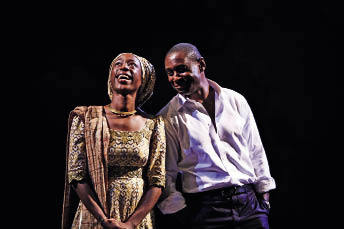Welcome to Thebes
Olivier, in rep until 18 August
La Bête
Comedy, booking to 4 September
My mind didn’t just boggle. My whole body did. Every sensory organ joined in the process — ears, eyes, nose, teeth, tongue. All boggled. Even my left shoulder started boggling at one point, although this turned out to be the oscillating snuffles of my neighbour as he dozed serenely against my arm. The source of these disturbances was Moira Buffini’s reconfiguration of Sophocles’ Antigone, which is currently chasing its tail around the Olivier. The setting is a hyper-muddle. We’re in Thebes, a failed third-world state, where kids armed with machine guns strut about the place jabbering in the gangsta patois of east London. Though the citizens of this imaginary hellhole are starving and brutalised they are also enlightened freethinkers. They can’t read or write but they know their Simone de Beauvoir backwards and they’ve just elected their first female president, Eurydice.
Meanwhile, Theseus, the leader of a nearby superpower, has arrived by helicopter to monitor the new government’s progress, and he watches with wry detachment as President Eurydice, showing a Hattie Harmanesque flair for gunpoint egalitarianism, selects an all-female cabinet. What’s missing from this pick-and-mix fantasy is any clarity or coherence. It’s tribal and backward. It’s feminist and progressive. It’s then. It’s now. It’s Athens, it’s Somalia, it’s Afghanistan. It’s irritating. At one point Ms Buffini tries to honour her Sophoclean sources and her matriarchal longings by making President Eurydice forbid the burial of Polynices on the grounds that the turf where his body is rotting should become a ‘peace park’ in which citizens might ponder the evils of war.
As soon as this wonky brainwave teetered out of Ms Buffini’s mind she should have admitted defeat and dropped the script in the ‘Noble Failure’ drawer which every playwright keeps half-open in order to protect the world from unnecessary torments and to preserve the public morale of the theatre. Alas, Ms Buffini indulged herself and continued writing. The National indulged her indulgence and the result is the silliest, dullest and most scatterbrained version of a Sophoclean tragedy I can recall seeing. Richard Eyre’s production can’t hope to settle on a satisfactory tone. Triple-thick melodrama is overlaid with preachy pacifism and Varsity knockabout. (Oedipus is referred to as ‘that mother-f**ker’ — which is at least quite funny.)
Atop this wobbly ziggurat stands David Harewood, who plays Theseus with all his customary grace and zeal, but he’s like a football star doing keepy-uppy on the beach during August. The serious action starts next season and till then he’s just keeping in trim. Under Nicholas Hytner the National has undoubtedly enjoyed a golden era but the metal is not quite pure. Devotees have noticed a pattern. The revivals tend to be hits whereas the new plays tend to fire blanks. This attempted detonation is a dud round in the Olivier’s very empty chamber.
La Bête, a pastiche of Molière, was written nearly 20 years ago by the American dramatist David Hirson. Rhyming couplets are almost invariably toxic on stage but Hirson handles them with absolute assurance. Amusing and elegant rhyming pentameters flow from his pen with unobtrusive ease, and the script is an astonishing display of sustained technical brilliance. The play, a slender confection, concerns two dramatists competing for the patronage of a Princess (played by a spirited Joanna Lumley). The opening hour is dominated by Valere, a monstrously egotistical writer, who lays claim to every moral and intellectual virtue known to man. Mark Rylance succeeds in making this charmless slob utterly adorable, while Elomire, his rival played by David Hyde Pierce, watches and seethes in mute indignation.
Hyde Pierce is something to behold. His look of stilted outrage has no peer on the planet. His jaw locks, his lips tighten, his jugular throbs and bulges, and his clenched face becomes a mighty atom of frustrated rage. What a shame this part is too slight for him. (He could play Valere brilliantly. They might consider alternating the roles.) He finally gets his moment late in the play when he offers a devastatingly witty critique of Valere’s work and personality. (The Princess calls Valere ‘an idiot savant’ and Elomire nods. ‘I partially agree.’) This is an enjoyable play but a very lopsided one. After 90 minutes of farce it modulates into a hasty debate about the theatre’s primary function as entertainment or as sociopolitical analysis. This felt like a tardy attempt to cram in some last-minute meat lest the audience went home hungry.
So the curtain fell and the stars re-entered and were greeted by thunderous applause but no standing ovation. Exit cast. Re-enter cast. More applause, still no ovation. Exit cast. At this point we realised we were in an ‘EU referendum situation’ and the question would be put to us until we gave the correct answer. Re-enter cast. We rose, applauding. Then they cleared off and left us alone.







Comments